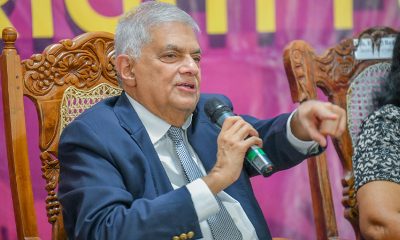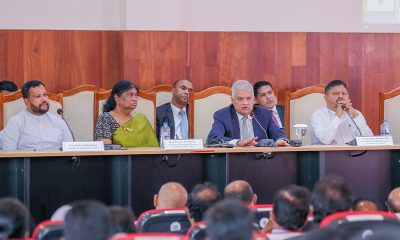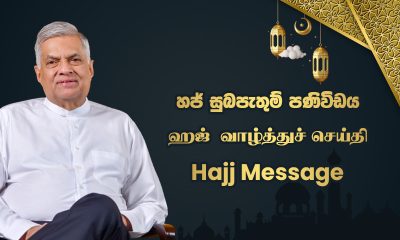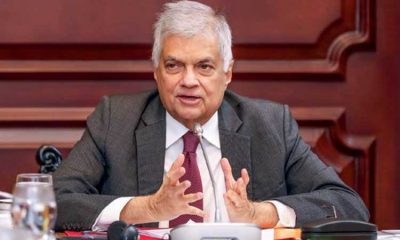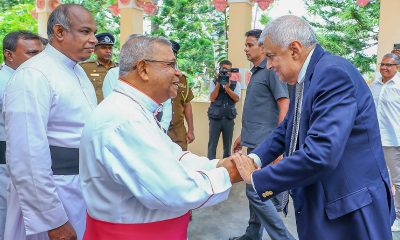Features
Charity; soon drastic water cuts; overseas idiosyncrasies

 Our President Ranil Wickremesinghe, who goes his own way following Sinatra’s I did it my way; mostly flying across oceans to attend this meeting and that, has again done it his way. He has initiated a million-dollar fund to help children of the Gaza strip. They are in a horrifyingly pitiable state and need all the help they can get, but can a bankrupt country, still far from becoming solvent, extend big charity to the outside world? Also, what about our children of this country driven to poverty by greedy, heartless political bosses who amassed wealth and let the country go to pot as we used to say.
Our President Ranil Wickremesinghe, who goes his own way following Sinatra’s I did it my way; mostly flying across oceans to attend this meeting and that, has again done it his way. He has initiated a million-dollar fund to help children of the Gaza strip. They are in a horrifyingly pitiable state and need all the help they can get, but can a bankrupt country, still far from becoming solvent, extend big charity to the outside world? Also, what about our children of this country driven to poverty by greedy, heartless political bosses who amassed wealth and let the country go to pot as we used to say.
Our children in dire need of help
It has been reported that many of our children are malnourished. The school mid-day meal programme was discontinued. The dropout rate among school goers due to the inability of parents to afford the pittance needed to send their children to schools within the free education system is increasing by the day while small village schools, more especially primary schools, are being closed. The infants in these villages will get no schooling because parents cannot afford to travel far to take their children to bigger schools. A video clip Cass received showed a woman from Moratuwa or Kalutara saying that principals had been made to announce that children could attend school sans shoes and even slippers. This to ensure attendance of the poorer child.
And here Sri Lanka is – extending largesse to a country at war due originally to its own militants invading a very powerful nation backed by the US of America. The entire rich world is ready to help Gaza including the UN. Who will help corruption-ridden Sri Lanka?
Doesn’t Ranil W know the old saying “charity begins at home”? While his right hand extends millions of dollars to Gaza kids his left orders the navy to send a ship to the Red Sea. Helping both sides: Palestine and Gaza alongside aligning with the US and Israel.
Fearful prediction
Cassandra’s role inherited from her Trojan ancestor is to cry out warnings through seeing the future with her whatever eye. The original Cassandra cried out “I see blood” and blood did flow as her captor Agamemnon was done to death by his wife Clytemnestra and her adulterous lover Aegisthus soon after he returned victorious from the Trojan War, bringing Cass along.
Present-day Cassandra cries out “Water, water, everywhere, not a drop to drink!” It may not come to that unthinkable state, but certainly there will soon be water cuts in Colombo and its suburbs. The searing heat and drought are predicted to continue till mid-April. And what are the water supplying authorities doing about this preventable calamity? Only issuing a small notice in the newspaper advising people to use water sparingly. Will people oblige? Certainly not! Not in dear, free Sri Lanka. People continue overwatering their gardens, washing limos daily, and even drenching with water the road in front of bungalows to keep the said bungalows free of dust and warming. The consequence will be water cuts getting severer as the lack of proper rain showers continues.
The authorities should be doing much more to force curtailment of water usage. It is a crime to use drinking water to drench gardens. Officers of the authorities or the police should patrol roads and streets and mete out punishment to households who over use water for wasteful purposes, unless of course they have tube wells in their premises. Much better by far to curtail use of water and distribution gradually from now on, than slam people with prolonged water cuts.
Another fact of irrigation that has bothered Cass for years is the fact of overflowing of irrigation tanks and sluice gates being open causing flooding during rainy seasons in the Dry Zone and then just a month or two later, proclaiming water levels in wevas are drastically low and thus no release of water through canals to paddy cultivators and other farmers. Farmers are hit by flooding and then by water shortage. Is it that our wevas need dredging so capacity to hold water is increased?
Supposedly, a very delicate operation needing expertise. But it has to be done to prevent floods at one time and stoppage of irrigation water at other times, these alterations following each other closely. Cass remembers only one instance of dredging. That was in a large ancient weva, supposedly ordered by the eldest Rajapaksa brother during a younger brother’s tenure as the President of the country. The dredging was certainly not to help the country’s farmers but to help oneself get rich by extracting a mineral from the dredged soil. Correct her if Cass is wrong here.
Generous spooning out
Cass does not want to comment on the very generous (prefer the adjective stupendous) increase given Central Bank employees; one reason supposedly being to stem migration of CB workers. What about docs and academics? Equally or even more vital to the nation. She does not comment on matters she knows next to nothing about. But she was stunned to hear that even a low-level CB worker is paid more than Rs. 150,000 a month as salary. She passes on a comment made by an ex-CB worker who enjoys a generous pension and health benefits. “Far too much an increase in these times of dire restrictions and difficulties suffered by others.”
Cass was reminded of a certain librarian – long departed to hell probably – who issued exam results as he wanted and that meant with favouritism to the fore because, as he claimed, “Bedana handé magé athé, meaning” I hold the serving spoon.” Is the spoon wielder in the instance referred to, the much-respected by all Dr Nandalal Weerasinghe?
The Ugly A gets uglier
We have plenty of loose mouths in this fair isle of ours, mostly carelessly chattering gabs of politicians. The latest was the Minister of Tourism, Sports, etc., spouting out that our airports and seaports belong to India. Who was he to donate our assets, or now burdens, to our powerful neighbour? Cassandra believes that he, Harin Fernando, was in India when he generously and illicitly bequeathed India our properties. Was he crying for his supper? He definitely was speaking nonsense and damaging our country at that.
We have an out-doer of crazy speech in the US of America: none other than the Republican choice to contest the presidential election, which of course will be held when it is due, unlike in this country boasting a 2,500-year illustrious heritage now held hostage to government money and a dictatorial President and saying aye-to-anything governing Party.
Cass was sent a clip of a recent rally speech by Trump. He swore several times over that he loved the Blacks; they were great supporters of his and they loved him in return. The commentator then showed the audience that shouted at almost every word Trump spouted. All whites roared their approval while being wined and dined.
One surmises the entire country that names itself the leader of the world is going crazy, mad really to want a president like Trump who faces so very many charges of cheating, paying compensation to women sexually abused by him, and other offences.
President Joe Biden too loses credit. He weakly says he “hopes there will be a ceasefire in Gaza by next week.” In the UN Security Council, The US of A vetoed the call by the UN for a ceasefire in the Israeli-Hamas war. This while the count of those civilians dead in Gaza mounts beyond 30,000.
Features
Agnotology, ethnicity, and New Year resolutions
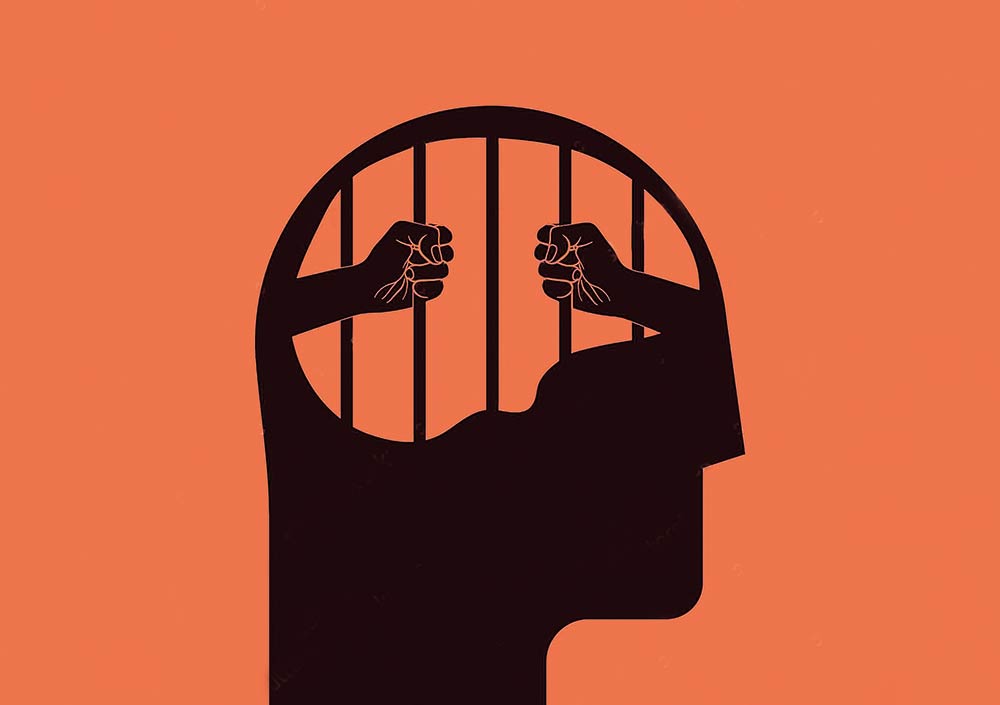
by Geewananda Gunawardana
It is encouraging that the piece on agnotology and ethnicity (The Island December 4, 2024) elicited an erudite discourse (‘Ethnicity and genetics – A non-racial academic response’ and ‘Ethnicity – a synonym for confusion,’ The Island December 11 and 16, 2024, respectively) concluding that ethnic divisions have no biological basis. However, we cannot overlook the fact that humans have an evolutionary tendency to belong to a group, clan, or cult for survival purposes; we are social animals. Not having fangs, claws, venom, or any other protective anatomy, tribalism is the way humans have chosen to defend themselves. Unfortunately, the same evolutionary force makes us blind to the hazards of this habit. Throughout human history, this vulnerability has been exploited by story tellers of all stripes and spots to bring us under their fold and fatten themselves. We Sri Lankans tend to fall for such stories at an alarming rate with grave consequences. That is the focus of agnotology: the investigation of our weakness in believing stories, or the resulting culturally induced ignorance, and its effects on our society. It goes beyond ethnic relations.
One thing must be made clear, there is no point in continuing endless academic discourse and hoping for problems to go away. What is necessary is to find ways to reduce and finally eradicate culturally induced ignorance, or the habit of adhering to baseless, false stories that are harmful or counterproductive, and put them into action.
It is a fact that unlearning is much harder than learning. Therefore, it is best if we can stop learning such baseless, fake stories in the first place. The unpleasant truth is that it can be too late for some segments of society as such stories are deeply engraved in their minds. They will reject the facts, and we have no choice but to look beyond their objections. Therefore, the best remedy is to stop our children from learning culturally inherited myths, beliefs, and practices that disrupt harmony, waste valuable resources, and stop us from joining the 21st century. We must tell them the truth that they are poems, myths, and beliefs, etc., and they should not be accepted as undisputable truths. We must train the younger generation to think critically and have the skill to separate facts from fiction, instead of being blind followers. If the Buddha could say that about his teaching, why cannot we say the same about fabricated stories with hidden agendas?
It is inevitable that there will be a deafening outcry that such actions will ruin our proud culture and heritage. There is absolutely no need to let that happen; we can continue culturally and religiously important activities intelligently if we knew their true meaning and that we are not manipulated by some storyteller for their benefit. We must give our children the facts and train them to make sensible decisions rather than blindly following rituals. Even Buddhism teaches us that following rituals blindly is a barrier to liberation.
We have paid dearly for inflaming ethnic division. Let us not forget that the civil strife had cost the nation more than twice the current debt. Should we continue to spread questionable theories that try to prove one is superior to the other or one arrived before the other and has a larger claim to the land? Is it necessary to impress children by glorifying the battle between Dutugamunu and Elara that happened two thousand three hundred years ago? Or, is it more important to convince them that divided we will continue to wallow in misery?
Let us not forget that whether it is the iron age or the 21st century, the root cause of these evils is the elite that manipulate these stories to their benefit. We managed to sideline the old elite, the establishment, or the aristocracy, but there is a new elite trying to raise its ugly head: the so-called academic elite. Please do not jump to conclusions. There is no need to explain again when elite becomes a dirty word but let us be clear that there is an honourably learned community that provides a valuable service to the country. We value them. It is the fake academics that we must be weary of. Let us admit that it is the cream of the cream that enters our public universities. Whether they exhibit additional letters before or after their names or not, we must bear in mind that they are the smartest lot the country has produced. Whether the country reaps the investment made in them or not is a different issue.
Those who could not get in are not necessarily inferior, it is just that the others did better; and if they can afford it, they continue their education in private institutions here or abroad. Unfortunately, this is where elitism raises its ugly head; we want meritocracy for good reasons, but did everyone get an equal opportunity to collect such merits? We have a habit of giving more weight to foreign degrees, a residue of elite veneration, without verifying the quality of the granting institution or the veracity of their claims. It is no secret that it is possible to buy a degree in some countries. Even worse, I know firsthand an individual who worked as a checkout clerk at a pharmacy chain abroad and paraded as a doctor back at home! However, in this internet age, there is no need to be ignorant, to be gullible and believe their stories; few questions and a quick search of the web can verify their claims, and stop the emergence of a new elite, the bad kind. Let us ask not what letters they have added to their names but ask what they have done or can do to solve problems (my apologies to JFK).
We shamelessly propagate many stories that originated in the iron age without ever questioning their relevance to the 21st century. The ugliest of them is the caste system. We must question the value, or the purpose of following a social stratification system started by nomadic farmers from the central Eurasian Steppes to safeguard their feudal system four thousand years ago. Once again, it was their elite that deceived the humble peasants and took advantage. Imagine starting a similar system by treating descendants of computer programmers differently from those of civil engineers, for example. Force them to have different naming systems, prevent intermarriages, live in segregated enclaves, and assume one is above the other. It is a disgrace that we keep this system and go to the extent of forming separate voting blocks.
Another antiquated practice we hang onto is astrology, which started in Mesopotamia. They used the cyclic movement of celestial bodies as a calendar to plan their agricultural activities. Their geocentric models of the cosmos did not allow them to realise that the seasonal changes are the result of the tilt in earth’s rotational axis and varying distance to the sun. This ignorance made them elevate seasonal changes to acts of divinity. It is true that the gravitational force of the moon causes tides, but how can nuclear furnaces that are light years away impact human lives on earth? Science has yet to discover any such forces or find any evidence that astrological predictions have any basis. There are billions of people who lead healthy successful lives in this world without ever following astrology. Instead of astrology, let us teach the children astronomy, so that they will understand that climate change is not a hoax.
The Age of Reason along with scientific revolution started in the 17th century helped humanity get rid of baseless beliefs and myths that were used by the elite to retain power. Unfortunately, we seem to have missed that revolution and are still trapped in the past. That is no accident either: the elite had done their part to limit our access to knowledge. The underlying reasons that resulted in the widespread tuition business that sells knowledge are good examples. The disparity in the quality of public schools between urban and rural areas is another; do the elite send their children to rural schools? According to one report, over eight hundred rural schools had been closed permanently by 2023. The school dropout rate due to poverty is estimated to be about 30 to 35 percent. Is there any doubt that quality education is only for the elite?
Not only that many practices we engage in have no real value, but they also funnel our precious resources to nefarious activities. Unfortunately, these stories are so deeply engraved in our collective psyche that we do not have the will to challenge them. That is the power of storytelling, and its role in shaping our destiny. This is particularly ironic for one important reason. The goal of the ‘Age of Reason’ and the ancient tradition that most Sri Lankans venerate, protect, and give their lives to preserve have the same goal: understanding the natural world and humanity’s place in it through reason: knowing reality. Unfortunately, instead of following that guidance, we have shrouded that timeless truth we inherited with practices based on beliefs, myths, and mysticism. We have legitimized many primitive practices such as rituals centered on appeasing deities, demons, ghosts, clairvoyant reading, and other numerous spirits bringing them under the umbrella of that venerated tradition and blinding ourselves to truth.
We fail to see that communicable diseases are caused by germs and not by angry spirits, and the absurdity of appeasing higher powers for cures instead of using proven medications. The facts of a simple biological event such as reaching puberty are often buried under rituals; the associated taboos impact females from participation in education and in the work force and, at times, risk their health. The period poverty is discussed in high circles, but does it help the needy? These practices teach our children to leave their destinies at the mercy of mystic superpowers instead of taking control of their lives themselves. There lies the biggest obstacle to prosperity. These are all difficult subjects to deal with, but we must initiate a dialogue on the information gap at a minimum if we must move the country forward.
There are many more practices and beliefs that hamper our progress. Hopefully, we will have the courage and wisdom to have that discussion, someday. Until then, we can do one thing at home: let us tell our children the truth. If our practices have artistic, cultural, and economic values, let us tell them so without wrapping them in mysticism. Let us teach them poems for their literary value but not as historical facts. Let them know that history is written by the victors and often gives the writer’s perspective. Let us teach them the value of rational thinking and help them join the 21st century along with the rest of the world. Let us have no doubt that a prosperous country can be built only on fact-based information that is objective, and not on opinions, beliefs, or assumptions inherited from the dark ages. Let elimination of such culturally acquired ignorance be our new year resolution.
Features
Cast out 2024 with its evils, and welcome promising 2025
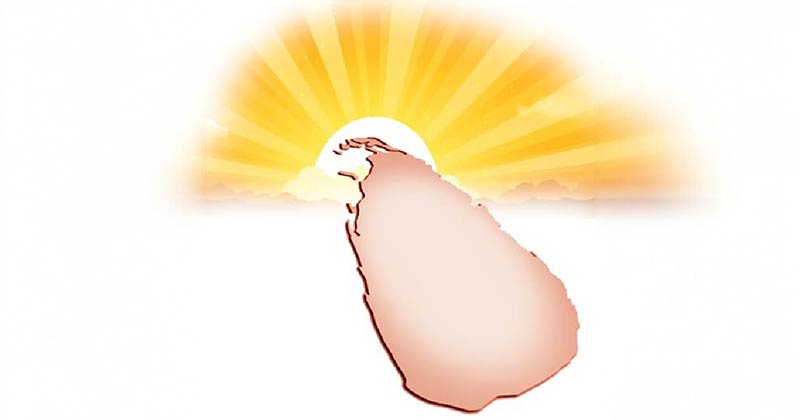
 “The bad news is time flies. The good news is you’re the pilot.”
“The bad news is time flies. The good news is you’re the pilot.”
Cassandra quotes below a poet she never could enjoy – Alfred Lord Tennyson (1809 – 1892). He was 1st Baron Tennyson and Poet Laureate during much of Queen Victoria’s reign. To her he sounds pompous but his Ring Out Wild Bells is a simple poem and she found it apt at this time. Two stanzas of the poem go thus:
Ring out the want, the care, the sin, / the faithless coldness of the times;
Ring out, ring out my mournful rhymes/But ring the fuller minstrel in.
Ring out false pride in place and blood, /The civic slander and the spite;
Ring in the love of truth and right, /Ring in the common love of good
.I am certain you reader will guess the implied meaning Cass has in mind when quoting these lines. Yes and a loud YES; Sri Lanka is ringing out the bad, ugly, mean, corrupt, pompous pride and bloated egos of those who ruled us. The majority of us have hope in our hearts and look forward to an all-round improvement in how the country is governed. We also are sure the new people at the head of government and state are very different from those Big Wigs of this year before October and down the years, who so drastically dragged the country down to the very depths of deprivation and bankruptcy.
Tennyson rings out the want, the care, the sin; the faithless coldness of the times.
Yes, the times of waiting days in queues for essentials is over. Some may remind Cass it was Ranil W, who did away with queues by taking the right economic decisions. Yes, partly, but during his time as Prez he could have done much more to ease the lot of not only the poorer segment of Sri Lanka’s population but all who suffered. And this while 90 odd persons were advising him and running around in luxury cars while we suffered deprivation.
There certainly was ‘faithless coldness’ during times past when decisions were taken to please the very small minority of the rich at the expense of the rest of Sri Lankans. Coldness we associate with Prez Gotabaya and ‘false pride in place and blood’ during the years Mahinda R was Prez with his favoured persons doing just as they please, not caring one jot for those they made to suffer. Cold unconcern. Coldness is attributed to Ranil W. Comes to mind Keheliya Rambukwella and Lohan Ratwatte, the former importing medical drugs that were ineffective or lethal; the latter strutting in prisons at night with a thigh exposing woman friend. The list of crimes is very long.
Tennyson calls for a ringing in of love of truth and right and common love. AKD, Harini, Vijitha Herath and others of the NPP are ringing in truth and honesty; right government ensuring people’s rights; and intending to end the evils of corruption, nepotism, favouritism and family bandyism of concern only for the wellbeing of families.
A sense of empathy and concern for the country and its people by those in power is definitely in the air, which was never present, except as far back as when DS Senanayake, Dudley Senanayake and John Kotelawala were in power. Kotelawela showed concern in his own brusque way. They were not self-centered and we do not expect our new leaders to be this, even to the slightest degree.
Cassandra’s summation on the state of the country and people’s perceptions is optimistic. The country will sure improve and Ministers in the Cabinet will work to improve the country and its people, not themselves. When honesty, commitment and selflessness are apparent in political leaders, lesser ones too will follow. Thus, we could expect bureaucrats who serve the country with honesty and dedication.
Accidents and apparent incompetence
We are glad the Police have taken due note of the far too many road accidents and have started preliminary findings to arrive at the root of the serious trouble. As the Editor of this newspaper commented in his editorial on this subject, common causes of road accidents are incompetent drivers; road unworthy vehicles; buses plying competitively for fares; and drivers and bus conductors addicted to drugs or intoxicating drinks and being at the wheel under either influence. Also, their being over-worked with far too long spells driving. All these can be remedied. Strict supervision of drivers and vehicles; bus owners being law abiding; the Police taking preventive and punishing action; and punishment meted being severe.
Cassandra experienced the crass incompetence and, perhaps, the debilitating influence of drugs on a driver of a motorbike. She was informed by a friend that a parcel was being delivered to her by one of the delivery services now having good business during this season of gift giving. The delivery man was to be expected around 8.30 pm, the friend said. Cass waited till 9.30, her equanimity fast disappearing and her ire rising. She phoned her friend who contacted either the delivery service or the courier. She was promised he would be at her door in 20 minutes. The clock hands showed 10.30 pm. The driver contacted her. She gave him detailed directions to her home, which even an idiot could follow.
No delivery. She phoned the delivery man, thrice. Each time she heard the motorcyclist ask people directions to Cass’ abode and they gave very accurate directions. But the man could not follow them. She called him. He was just a couple of yards away but at a cross roads, which he should never have been in. Directions were given – simple, easy to follow and unambiguous. No man, no parcel. She sent her domestic to the end of the lane leading to her place. Man finally appears at 11.45. Cass was beyond throwing a tantrum and closer to a stroke or heart seizure.
She was sure, though inexperienced in dealing with druggies, that this driver was under the influence of a drug which dulled his senses to near zero. Her Man Friday tells her that young men are recruited from places far distant from Colombo and do not know its roads and streets. No excuse at all. Glaring faults of employers are non-caring and greed for profit at any cost. Fault of employees: sheer incompetence and immorality in being under the influence of drugs or drink while on the job.
This anecdote is to highlight possible-to-be-remedied faults of businesses. Even government offices had don’t-care-less employees. That will change, and sure must already have changed. Thankfully, Prez AKD gave govt employees a strong pep talk: do your job or you will be made to quit.
Cass ends this Friday’s optimistic Cry with wishing each of her readers a very happy New Year with much less burdens to bear and life improving with hope and anticipation. Gratitude to those who govern us can be given again, replacing the disdain and dislike, hate too, felt earlier. A New Year to the country we love so much of increasing prosperity, equal rights to all and peace!
Features
Navigating the Dragon’s Den: Sri Lanka’s strategic balancing act ahead of President AKD’s visit to China
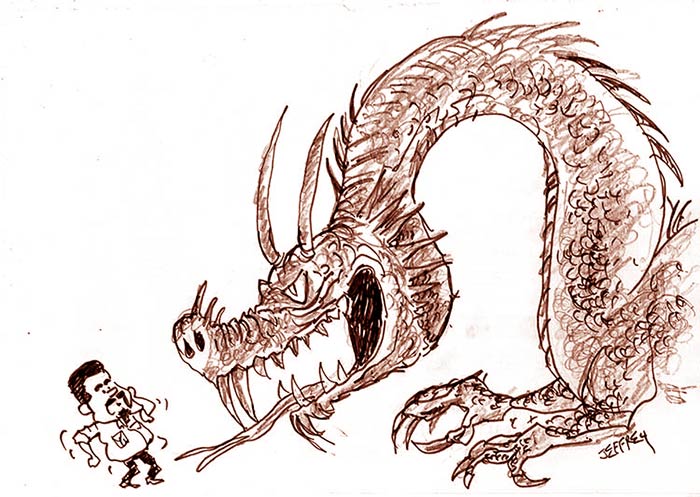
by Professor Chanaka Jayawardhena
President Anura Kumara Dissanayake is scheduled to embark on a state visit to China early next year, following his recent diplomatic success in India. As Sri Lanka rebuilds from the ashes of an economic meltdown, this visit will serve as a pivotal moment, shaping not just bilateral relations but also the island’s broader economic and geopolitical trajectory. While the allure of Chinese investments may offer short-term relief, the stakes are high: the decisions made during this visit could either cement Sri Lanka’s recovery or deepen its vulnerabilities.
The Economic Promise: Opportunity at the Doorstep
China’s economic might is undeniable. As the world’s second-largest economy and a leading investor in developing nations, China has demonstrated a remarkable ability to deploy vast sums of capital into infrastructure projects and industrial ventures. For Sri Lanka, a nation grappling with limited fiscal space, Chinese investment could unlock opportunities in critical sectors such as energy, transport, and manufacturing.
The Hambantota Port stands as a testament to the scope of Chinese involvement in Sri Lanka. Despite initial controversies, the port has emerged as a strategic hub, offering potential for revenue generation and job creation. However, the same cannot be said for the Mattala Rajapaksa International Airport, often dubbed the “world’s emptiest airport.” While envisioned as a key logistical and passenger hub, the airport has yet to realise its potential, serving as a reminder that infrastructure investments must align with realistic demand projections and comprehensive planning. Addressing this gap should be a priority during discussions with Chinese counterparts, ensuring that such projects contribute meaningfully to Sri Lanka’s economic landscape.
Additionally, enhanced trade relations with China offer significant upside. As Sri Lanka seeks to diversify its export portfolio, targeting China’s vast consumer base could invigorate key industries such as apparel, seafood, and tea. Establishing favourable trade agreements during this visit could pave the way for sustainable economic growth, moving beyond aid and debt reliance.
The Geopolitical Tightrope
The geopolitical stakes for Sri Lanka are both immense and intricate, requiring delicate balancing between its key regional partner, India, and the opportunities presented by China. India remains Sri Lanka’s closest neighbour and has historically shared deep cultural, economic, and security ties with the island nation. India’s contributions during Sri Lanka’s economic crisis, including emergency financial aid, are a testament to its enduring commitment. However, India also views any expansion of Chinese influence in Sri Lanka with heightened concern, perceiving it as a potential security threat within its sphere of influence in the Indian Ocean region.
President Dissanayake must walk a fine line during his visit to China, ensuring that the agreements forged do not alienate India or exacerbate regional tensions. While pursuing Chinese investments, Sri Lanka must communicate its intentions transparently to India, emphasising that its engagement with China is rooted in economic pragmatism rather than any geopolitical alignment. Joint initiatives with India, such as collaborations in regional trade and maritime security, can serve as confidence-building measures to assuage Indian apprehensions.
China, on the other hand, presents unparalleled economic opportunities. Investments in infrastructure, manufacturing, and renewable energy could provide Sri Lanka with a much-needed economic boost. However, Sri Lanka’s leadership must remain vigilant to avoid the pitfalls of overdependence on China, as evidenced by the debt crises faced by other nations engaged in the Belt and Road Initiative. The priority must be projects that not only bolster the local economy but also preserve national sovereignty.
To emulate the success of nations like Vietnam, Sri Lanka can adopt a “bamboo foreign policy”—firmly rooted in its national interests yet flexible in adapting to the complexities of great power politics. Vietnam’s ability to maintain economic ties with China while cultivating strategic partnerships with the United States, Japan, and ASEAN countries offers a valuable model. Sri Lanka, too, must engage other global players, ensuring a diversified set of partnerships that prevent over-reliance on any single nation.
Moreover, Sri Lanka’s policymakers must focus on ensuring that the benefits of Chinese investments accrue to Sri Lanka itself, rather than serving external strategic interests. This includes rigorous scrutiny of project proposals, transparent procurement processes, and an unwavering commitment to prioritising projects that yield tangible economic returns for the Sri Lankan people.
The challenge lies in balancing these dynamics while maintaining Sri Lanka’s sovereignty. A comprehensive, long-term vision that places Sri Lanka’s national interests at the forefront is essential. Investments should align with the country’s development goals, fostering economic resilience and reducing external vulnerabilities. Ultimately, the success of this balancing act will determine whether Sri Lanka can emerge as a stable and independent player in the region or remain a pawn in the larger geopolitical chessboard.
Potential Pitfalls: Lessons from the Region
Sri Lanka’s impending engagement with China is fraught with risks, many of which have been experienced by other nations. Laos, for instance, has faced severe debt distress due to over-reliance on Chinese loans for infrastructure projects under the BRI. Similarly, Zambia’s excessive borrowing from China has resulted in contentious renegotiations and fears of asset seizures. These examples underscore the importance of scrutinising loan terms and prioritising projects that deliver tangible economic returns.
Another potential pitfall is the erosion of sovereignty. Nations that over depend on Chinese investments often find themselves compromising on key policy decisions, whether in trade, security, or governance. Sri Lanka’s leadership must ensure that economic agreements do not come at the expense of national autonomy.
Moreover, transparency is critical. Corruption in procurement processes and project implementation has plagued many BRI initiatives, undermining public trust and long-term viability. President Dissanayake’s government, which has earned public confidence for its anti-corruption stance, must maintain rigorous oversight over any agreements signed during this visit.
Charting a Vision for the Future
While the immediate focus of President Dissanayake’s visit will likely centre on securing economic investments, the government must adopt a comprehensive vision that extends beyond short-term gains. This vision should encompass three key pillars:
=Economic Sustainability:
Sri Lanka must prioritise investments that align with its long-term development goals. This includes focusing on renewable energy projects that reduce reliance on fossil fuels, thereby lowering energy costs and improving environmental outcomes. Digital infrastructure development, such as expanding broadband access, can drive innovation and attract high-value industries, while skill development initiatives can prepare Sri Lanka’s workforce for the demands of a modern economy. By diversifying its economic base, Sri Lanka can reduce its vulnerability to global economic shocks and ensure sustainable growth.
=Geopolitical Balance:
As Sri Lanka engages with China, it must simultaneously deepen partnerships with other nations, including India, our immediate neighbours in the SAARC region and the rest of both the western world along with the global south. Strengthening ties with India, its closest neighbour, ensures regional security and cooperation, while partnerships with any country with the means can provide access to alternative sources of investment and technology. A multilateral approach will mitigate the risks of over-dependence on any single nation and enhance Sri Lanka’s global standing. By actively participating in regional forums and initiatives, Sri Lanka can position itself as a bridge between competing powers, leveraging its strategic location to attract diverse opportunities.
=Social Cohesion:
The benefits of Chinese investments must be equitably distributed to avoid exacerbating social inequalities. Infrastructure projects should include components that directly impact local communities, such as job creation and skill development programmes.
Transparent planning and community engagement are essential to ensure that large-scale projects do not displace vulnerable populations or create environmental degradation. By fostering inclusivity and addressing the needs of all segments of society, the government can build public trust and strengthen social stability, which is vital for long-term development.
A Positive Path Forward
President Dissanayake’s forthcoming visit to China represents both a challenge and an opportunity. By adopting a cautious yet ambitious approach, Sri Lanka can harness the economic potential of Chinese investments while safeguarding its sovereignty and geopolitical balance. The lessons from countries like Vietnam, Laos, and Zambia serve as valuable guideposts, highlighting both the promise and perils of engagement with global powers.
Sri Lanka’s recovery journey is far from over, but the foundations for a brighter future are being laid. The government’s ability to navigate this complex landscape with transparency, vision, and pragmatism will determine whether the nation can emerge stronger, more resilient, and truly independent. As the president steps into the dragon’s den, the world will be watching—and so will the people of Sri Lanka.
(Views expressed in this article are personal.)
(The writer is Professor of (Chair) of Marketing, University of Surrey, UK. Linkedin: https://uk.linkedin.com/in/marketingchanaka, Email: Chanaka.j@gmail.com
-

 Sports6 days ago
Sports6 days agoPathirana set to sling his way into Kiwi hearts
-
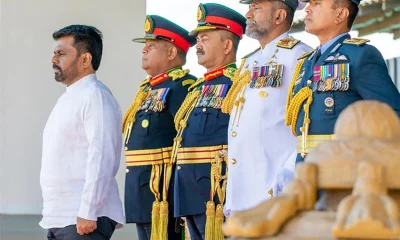
 News4 days ago
News4 days agoOffice of CDS likely to be scrapped; top defence changes on the cards
-
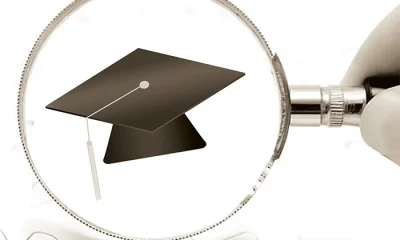
 Features4 days ago
Features4 days agoAn Absurd play in Parliament: Qualifications versus education
-

 Editorial6 days ago
Editorial6 days agoThe games they play
-
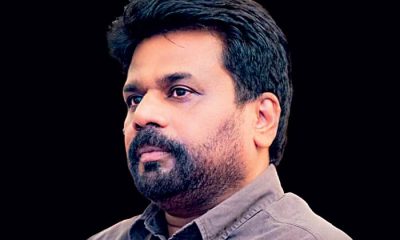
 Opinion5 days ago
Opinion5 days agoWhat AKD and NPP should bear in mind
-

 Midweek Review3 days ago
Midweek Review3 days agoEx-SLN seniors focus on seabed mining and Sri Lanka’s claim for the delimitation of the Outer Continental Margin
-
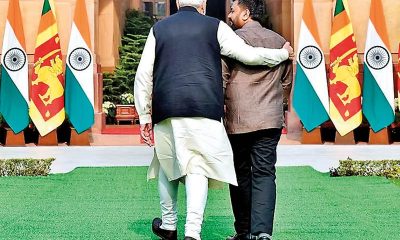
 Features6 days ago
Features6 days agoThe Government’s Term Tests & Results: The Good, the Bad and the Ugly
-

 Editorial5 days ago
Editorial5 days agoSeeyanomics, rhetoric and reality


